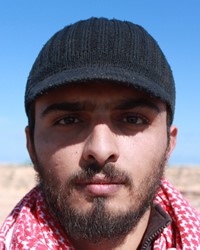Arab, Libyan in Libya

Photo Source:
Al Jazeera English - Flickr
Creative Commons
|
Send Joshua Project a map of this people group.
|
| People Name: | Arab, Libyan |
| Country: | Libya |
| 10/40 Window: | Yes |
| Population: | 1,580,000 |
| World Population: | 2,816,900 |
| Primary Language: | Arabic, Libyan |
| Primary Religion: | Islam |
| Christian Adherents: | 0.10 % |
| Evangelicals: | 0.04 % |
| Scripture: | Portions |
| Ministry Resources: | Yes |
| Jesus Film: | Yes |
| Audio Recordings: | Yes |
| People Cluster: | Arab, Libyan |
| Affinity Bloc: | Arab World |
| Progress Level: |
|
Introduction / History
Libya, which lies along the southern edge of the Mediterranean next to Egypt, is country that is largely desert or semi-desert. A large majority of the population of the country are Libyan Arabs or Arabized Berbers. They were mainly a nomadic society. Family life is a strong value for Libyan Arab families, and they still associate themselves with a particular nomadic Bedouin tribe.
Libya became independent from Italy in December of 1951. The discovery of oil in the 1950s radically changed the people's way of life. Muammar Gaddafi rose to power in 1969, and he remained a dictator until he was killed in 2011. During his many years in power, Libya enjoyed prosperity, but there was no tolerance for those who criticized the regime.
What Are Their Lives Like?
Libyan Arabs are in a constant, low-level conflict with each other. That is damaging their economy. Many lives are being lost.
What Are Their Beliefs?
Libyan Arabs are Sunni Muslims who believe that the supreme God, Allah, spoke through his prophet, Mohammed, and taught mankind how to live a righteous life through the Koran and the Hadith. To live a righteous life, you must utter the Shahada (a statement of faith), pray five times a day facing Mecca, fast from sunup to sundown during the month of Ramadan, give alms to the poor, and make a pilgrimage to Mecca if you have the means. Muslims are prohibited from drinking alcohol, eating pork, gambling, stealing, slandering and making idols. They gather for corporate prayer on Friday afternoons at a mosque, their place of worship.
The two main holidays for Sunni Muslims are Eid al Fitr, the breaking of the monthly fast and Eid al Adha, the celebration of Abraham's willingness to sacrifice his son to Allah.
Sunni religious practices are staid and simple. They believe that Allah has pre-determined our fates; they minimize free will.
In most of the Muslim world, people depend on the spirit world for their daily needs since they regard Allah as too distant. Allah may determine their eternal salvation, but the spirits determine how well we live in our daily lives. For that reason, they must appease the spirits. They often use charms and amulets to help them with spiritual forces.
What Are Their Needs?
Libyan Arabs need peace. Libya is destroying itself economically through an ongoing conflict.
Prayer Points
Pray that God would allow the gospel to be proclaimed among the Libyan Arabs.
Ask God to send workers out into His harvest field.
Pray that many believers around the world would intercede for these people.